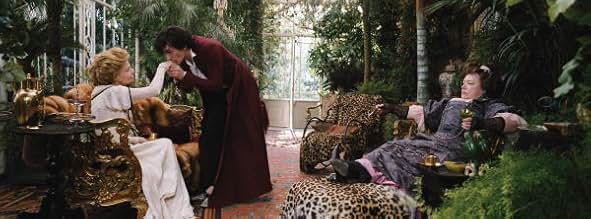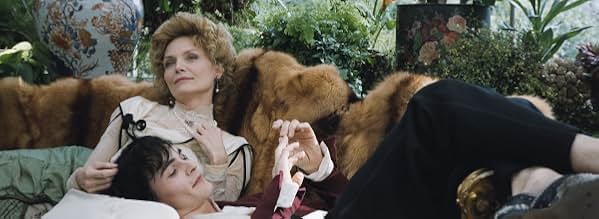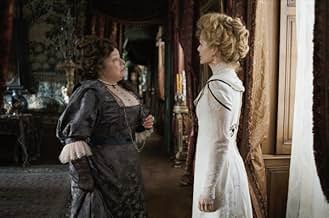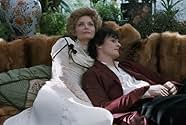VALUTAZIONE IMDb
6,1/10
11.957
LA TUA VALUTAZIONE
Il figlio di una cortigiana si ritira in un mondo di fantasia dopo essere stato costretto a porre fine alla sua relazione con la donna più anziana che lo ha educato alle vie dell'amore.Il figlio di una cortigiana si ritira in un mondo di fantasia dopo essere stato costretto a porre fine alla sua relazione con la donna più anziana che lo ha educato alle vie dell'amore.Il figlio di una cortigiana si ritira in un mondo di fantasia dopo essere stato costretto a porre fine alla sua relazione con la donna più anziana che lo ha educato alle vie dell'amore.
- Regia
- Sceneggiatura
- Star
- Premi
- 3 vittorie e 2 candidature totali
Recensioni in evidenza
Why is this movie rated as 6.2 out of 10? Are people blind? Crowds of movie goers flock to Avatar and Alice in Wonderland, and stuff like Cheri are completely overlooked. This is a delicious flick, with a great unusual and touching romantic story, gorgeous early 20th century atmosphere and brilliant interpretations from gorgeous Michele Pfeiffer and Kathy Bates. The story flows slow and stylishly like the surroundings of Belle Epoque and the final is so moving it makes a stone cry. Definitely the best movie I saw in 2009 together with Bright Star from Jane Campion. Please go see it and don't believe anyone who tells you otherwise.
Stephen Frears has created some powerful and very well crafted movies: 'Dangerous Liaisons', 'My Beautiful Laundrette', 'The Grifters', 'The Queen', 'Prick up your Ears', 'Dirty Pretty Things', etc. One would expect that his experience in dealing with edgy issues would make him the perfect choice for adapting the famous French writer of 'naughty novels' - Colette - but somewhere in the flow of this production, perhaps in the Christopher Hampton's adaptation of the novel to screenplay, the original stories become perfumed and sanitized. And the reasons why this happened remain obscure.
The story is simple: courtesans in Paris must eventually retire form their lives of becoming wealthy through pleasing men of the higher class, and either they live out their lives in the luxuries of fluff or they must confront their aging and feel pangs of remorse as they end their lives alone, without a man to bolster them. Lea de Lonval (Michelle Pfeiffer) has been longtime 'friends' with Madame Peloux (Kathy Bates), even to the point of nurturing Madame's son Chéri (Rupert Friend) as he approaches manhood. Madame asks Lea to 'polish' Chéri for other women and after what might have been a brief fling in Normandy, the young Chéri and the aging Lea fall into a six year relationship. But as Madame realizes she needs grandchildren, she eventually finds a proper girl Edmee (Felicity Jones) for Chéri to marry. The remainder of the story is how these two age-disparate characters adapt to the 'social rules' of La Belle Epoque, suggesting that even under extraordinary circumstances the power of love is an issue that must be confronted.
Despite the performances by Pfeiffer and Friend (and even the miscast Bates) the story feels somehow sterile. Perhaps it is the out of place use of a male narrator who gives the film an unnecessary feeling of being a documentary, or the somewhat overused musical score of Alexandre Desplat, or the emphasis on costumes that hardly add to the beauty of Pfeiffer as Lea that keep the production grounded. It is a pleasant enough film, but hardly a memorable one. Grady Harp
The story is simple: courtesans in Paris must eventually retire form their lives of becoming wealthy through pleasing men of the higher class, and either they live out their lives in the luxuries of fluff or they must confront their aging and feel pangs of remorse as they end their lives alone, without a man to bolster them. Lea de Lonval (Michelle Pfeiffer) has been longtime 'friends' with Madame Peloux (Kathy Bates), even to the point of nurturing Madame's son Chéri (Rupert Friend) as he approaches manhood. Madame asks Lea to 'polish' Chéri for other women and after what might have been a brief fling in Normandy, the young Chéri and the aging Lea fall into a six year relationship. But as Madame realizes she needs grandchildren, she eventually finds a proper girl Edmee (Felicity Jones) for Chéri to marry. The remainder of the story is how these two age-disparate characters adapt to the 'social rules' of La Belle Epoque, suggesting that even under extraordinary circumstances the power of love is an issue that must be confronted.
Despite the performances by Pfeiffer and Friend (and even the miscast Bates) the story feels somehow sterile. Perhaps it is the out of place use of a male narrator who gives the film an unnecessary feeling of being a documentary, or the somewhat overused musical score of Alexandre Desplat, or the emphasis on costumes that hardly add to the beauty of Pfeiffer as Lea that keep the production grounded. It is a pleasant enough film, but hardly a memorable one. Grady Harp
After you get over how beautiful the lighting makes 51 year old Michelle Pfeiffer playing her age and how old it makes 28 year old Rupert Friend playing 19, there's not much else to love about Cheri. Or maybe you can love the sumptuous 19th century Paris estates, cars, and gowns of the idle rich, whose lives will morph into something less glamorous as the Belle Epoque slides into WWI.
Colette's two novels about Chéri (Friend) the son of wealthy courtesan Madame Peloux (Kathy Bates), are not just about an indolent but beautiful rich slacker; they also follow the good fortune of Lea de Lonval (Pfeiffer), an unusually beautiful and profitable courtesan who has shrewdly prepared herself for financial comfort but forget the cardinal rule of prostitutes: Don't fall in love.
After six years of lover's paradise, Chéri and Lea part as the takes an arranged bride. And that's all there is, folks, as the film moves from a robust ramble about the various courtesans to a dreary hour of Twilight-like longing between this old-fashioned Harold and Maude. Director Steven Frears, who has had a fair share of intriguing films and characters, just lets the camera make love to Pfeiffer and Friend without fleshing out the characters to let is know what is so lovable to be longing for so long. Writer Christopher Hampton with Dangerous Liaisons and Atonement on his resume can't seem to muster a memorable line or develop his characters from flat clichés into round characters.
I do concede that Kathy Bates delivering this line saved the film for the moment: "Don't you find that when the skin is a little less firm, it holds perfume so much better?" Said to Michelle Pfeiffer, these lines give Bates bite of the year honors and a brief respite from spare, meaningless dialogue.
Colette's two novels about Chéri (Friend) the son of wealthy courtesan Madame Peloux (Kathy Bates), are not just about an indolent but beautiful rich slacker; they also follow the good fortune of Lea de Lonval (Pfeiffer), an unusually beautiful and profitable courtesan who has shrewdly prepared herself for financial comfort but forget the cardinal rule of prostitutes: Don't fall in love.
After six years of lover's paradise, Chéri and Lea part as the takes an arranged bride. And that's all there is, folks, as the film moves from a robust ramble about the various courtesans to a dreary hour of Twilight-like longing between this old-fashioned Harold and Maude. Director Steven Frears, who has had a fair share of intriguing films and characters, just lets the camera make love to Pfeiffer and Friend without fleshing out the characters to let is know what is so lovable to be longing for so long. Writer Christopher Hampton with Dangerous Liaisons and Atonement on his resume can't seem to muster a memorable line or develop his characters from flat clichés into round characters.
I do concede that Kathy Bates delivering this line saved the film for the moment: "Don't you find that when the skin is a little less firm, it holds perfume so much better?" Said to Michelle Pfeiffer, these lines give Bates bite of the year honors and a brief respite from spare, meaningless dialogue.
This film is about the love affair between a young man called Chéri, and an older but very attractive woman called Lea.
"Chéri" is a strong film, just like Stephen Frears' previous effort. It is colourful, vibrant, emotional and captivating. The characters are well sculpted, especially Chéri and Lea. They are both captivating, making us care for them, longing to see them happy. Apart from being a love story, it also handles the issue of aging the fear of it in a sensitive and emotional manner. Michelle Pfeiffer's acting is excellent, her wide range of emotions show naturally throughout the film. I also applaud her for being unconventional in Hollywood, as she lets her age show in some films to mirror the theme of aging. In addition, the film's tone changes from light to serious, which also mirrors the issue of aging. I enjoyed watching "Chéri". It is a visual delight and a captivating love story.
"Chéri" is a strong film, just like Stephen Frears' previous effort. It is colourful, vibrant, emotional and captivating. The characters are well sculpted, especially Chéri and Lea. They are both captivating, making us care for them, longing to see them happy. Apart from being a love story, it also handles the issue of aging the fear of it in a sensitive and emotional manner. Michelle Pfeiffer's acting is excellent, her wide range of emotions show naturally throughout the film. I also applaud her for being unconventional in Hollywood, as she lets her age show in some films to mirror the theme of aging. In addition, the film's tone changes from light to serious, which also mirrors the issue of aging. I enjoyed watching "Chéri". It is a visual delight and a captivating love story.
One of the delights of this film is the lushness and perfection of the sets and costumes of the Belle Époque (c. 1890-1914). The sets and costumes are so gorgeous they threaten to overwhelm the actors. Threaten, but don't succeed. Michelle Pfeiffer is sensual and beautiful as the aging courtesan Lea—a woman approaching a "certain age," as the narrator (Stephen Frears) informs us. Lea has known the love and admiration of the wealthiest men in Europe, many of them titled. She has been wise to keep her heart out of her affairs. Then Fred, ("Cheri") the son of another courtesan (Kathy Bates) enters Lea's life, and she finds herself caring for the aimless but charming young man more than she should.
Kathy Bates is wonderful as Madame Peloux, a former competitor of Lea's—a woman who, if you squint hard (and catch the "portrait" of a younger Peloux) you can imagine having a gamine charm years before. Bates' acting moves effortlessly from laughing delightedly at smutty gossip to quickly assuming the pouting self-righteous expression of a disapproving mama as she discusses her son. From former courtesan to bourgeois matron in the blink of an eye. Bates carries this quick switch act off several times in the movie, and it's a pleasure to watch her skill at these rapid changes. The sets and costumes of Mme. Peloux, heavy 2nd Empire furnishings, stiff wired dressed with bustles, are beautifully contrasted with Lea's lighter look—slender, graceful, light. The clothes each character wears, and the styles of their respective homes, gives some subtext to the story. Mme. Peloux, a bit older than Lea, had her taste formed in an era of overdone stuffy pretentiousness, while Lea, a bit younger, has embraced the airy beauty of Art Nouveau.
The stultifying life of aging and former courtesans is well-depicted—unwelcome in respectable society they have to fall back on each other's company. Former competitors, they still can't help sniping at one another. Lea, as one of the youngest of the group, moves like a sylph among the faded charms of her cohort. One amazing scene: Among a bower of faded courtesans, one of them, a busty brassy red-head, cuddles and squeals like a teenager as she introduces her lover, a young man who's the son of one this woman's "official lovers." As she overwhelms the rather weedy young man with her caresses, the viewer can see Lea's discomfort—seeing the loud red-head and her boy lover seems like seeing a grotesque mockery of herself and Cheri.
Cheri, the title character, is played by Rupert Friend (Prince Albert in "The Young Victoria," and Mr. Wickham in the 2005 version of "Pride and Prejudice"). He's a young man who has only two responsibilities: marry, and manage the large amount of money his mother settles on him at his marriage. He's a young man without purpose, but finds love with Lea. What starts as a light-hearted affair turns into a relationship both Cheri and Lea need more than they realized. Lea and Cheri's affair ends—as does the wonderful era depicted in this gorgeous movie. The war ends Lea and Cheri's world. The 20th century starts with bleakness and hardness after the golden afternoon of La Belle Époque. We are indebted to Collette and Stephen Frears for showing us the loveliness, and even the artful decadence, of that time, and we are indebted to the talented cast for giving life to the "demi-monde" ("half-world") of that era.
Kathy Bates is wonderful as Madame Peloux, a former competitor of Lea's—a woman who, if you squint hard (and catch the "portrait" of a younger Peloux) you can imagine having a gamine charm years before. Bates' acting moves effortlessly from laughing delightedly at smutty gossip to quickly assuming the pouting self-righteous expression of a disapproving mama as she discusses her son. From former courtesan to bourgeois matron in the blink of an eye. Bates carries this quick switch act off several times in the movie, and it's a pleasure to watch her skill at these rapid changes. The sets and costumes of Mme. Peloux, heavy 2nd Empire furnishings, stiff wired dressed with bustles, are beautifully contrasted with Lea's lighter look—slender, graceful, light. The clothes each character wears, and the styles of their respective homes, gives some subtext to the story. Mme. Peloux, a bit older than Lea, had her taste formed in an era of overdone stuffy pretentiousness, while Lea, a bit younger, has embraced the airy beauty of Art Nouveau.
The stultifying life of aging and former courtesans is well-depicted—unwelcome in respectable society they have to fall back on each other's company. Former competitors, they still can't help sniping at one another. Lea, as one of the youngest of the group, moves like a sylph among the faded charms of her cohort. One amazing scene: Among a bower of faded courtesans, one of them, a busty brassy red-head, cuddles and squeals like a teenager as she introduces her lover, a young man who's the son of one this woman's "official lovers." As she overwhelms the rather weedy young man with her caresses, the viewer can see Lea's discomfort—seeing the loud red-head and her boy lover seems like seeing a grotesque mockery of herself and Cheri.
Cheri, the title character, is played by Rupert Friend (Prince Albert in "The Young Victoria," and Mr. Wickham in the 2005 version of "Pride and Prejudice"). He's a young man who has only two responsibilities: marry, and manage the large amount of money his mother settles on him at his marriage. He's a young man without purpose, but finds love with Lea. What starts as a light-hearted affair turns into a relationship both Cheri and Lea need more than they realized. Lea and Cheri's affair ends—as does the wonderful era depicted in this gorgeous movie. The war ends Lea and Cheri's world. The 20th century starts with bleakness and hardness after the golden afternoon of La Belle Époque. We are indebted to Collette and Stephen Frears for showing us the loveliness, and even the artful decadence, of that time, and we are indebted to the talented cast for giving life to the "demi-monde" ("half-world") of that era.
Lo sapevi?
- QuizWhen the project was in development during the 1990s, Jessica Lange planned to star as Léa de Lonval.
- BlooperIn the closing credits, 'thanks' are given to France's national railway, the Societe National Chemin de Fer, known as the "SNCF". However the credits have the letters out of sequence, calling it the "SCNF".
- Citazioni
Lea de Lonval: I'm probably making a fool of myself... but then again, why not? Life is short!
- Versioni alternativeThere are five different versions. Runtimes are: "1h 40m(100 min), 1h 26m(86 min) (United States), 1h 32m(92 min) (United States), 1h 32m(92 min) (Argentina), 1h 40m(100 min) (Berlin International) (Germany)".
I più visti
Accedi per valutare e creare un elenco di titoli salvati per ottenere consigli personalizzati
- How long is Chéri?Powered by Alexa
Dettagli
Botteghino
- Budget
- 23.000.000 USD (previsto)
- Lordo Stati Uniti e Canada
- 2.715.657 USD
- Fine settimana di apertura Stati Uniti e Canada
- 405.701 USD
- 28 giu 2009
- Lordo in tutto il mondo
- 9.368.242 USD
- Tempo di esecuzione1 ora 40 minuti
- Colore
- Mix di suoni
- Proporzioni
- 2.35 : 1
Contribuisci a questa pagina
Suggerisci una modifica o aggiungi i contenuti mancanti

































